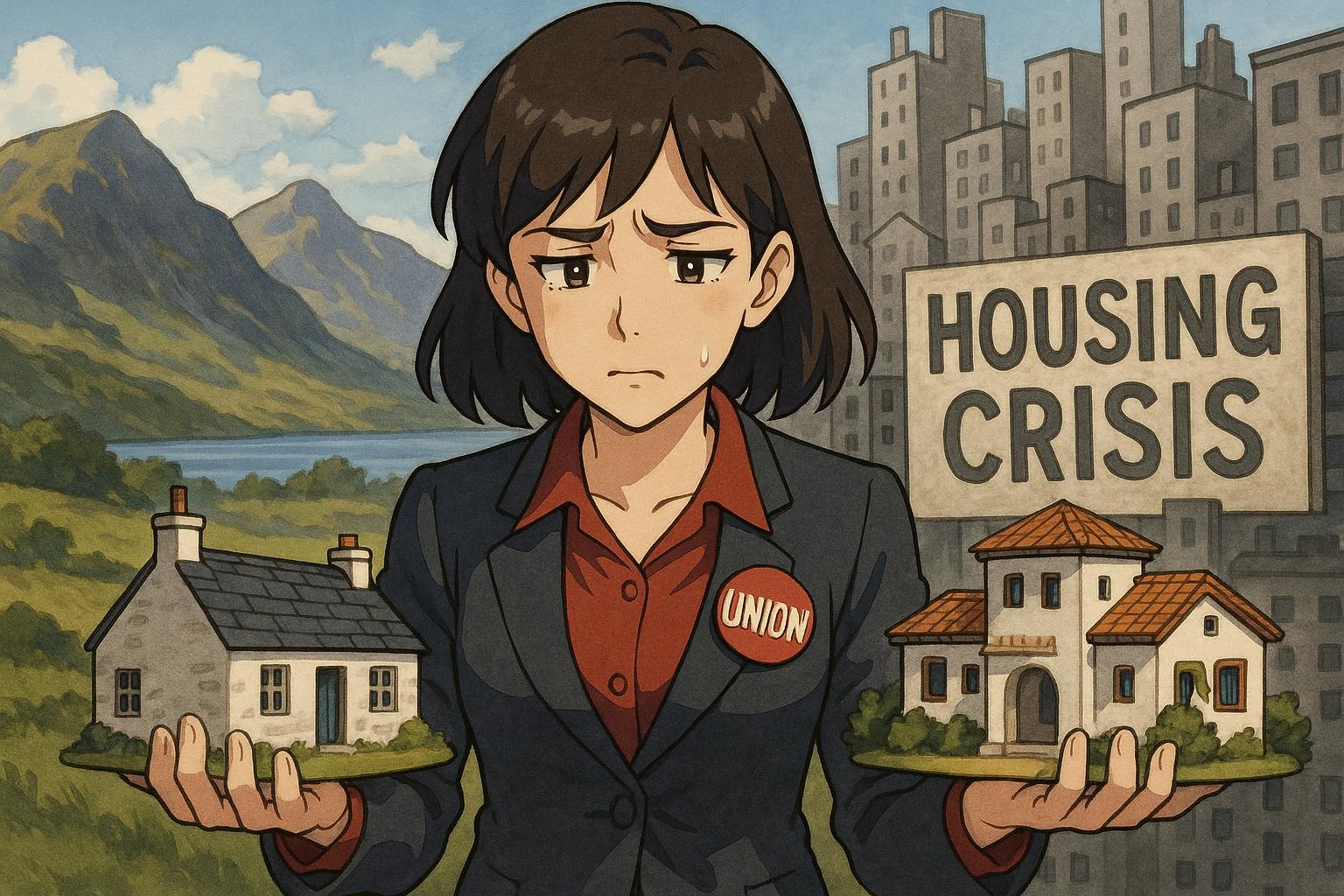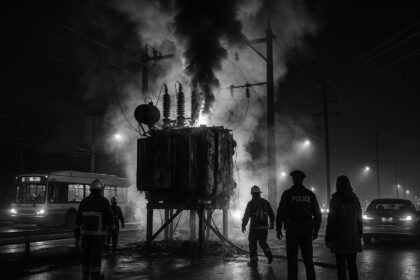Roz Foyer, General Secretary of the STUC, faces scrutiny after revelations she owns multiple properties including a Spanish apartment rented out for over £1,000 a week, contradicting her public stance advocating higher council taxes on second homes amid Scotland’s escalating housing crisis.
The recent revelations surrounding Roz Foyer, the General Secretary of the Scottish Trades Union Congress (STUC), have ignited a fierce debate on the implications of second home ownership in Scotland. Despite her vocal condemnation of multiple property ownership, it has come to light that Foyer owns not only a family home in Glasgow and a cottage on the Isle of Jura but also a luxurious three-bedroom apartment in southern Spain. The disclosure, which reveals her renting out the Spanish property for over £1,000 a week, raises questions about the authenticity of her stance on housing issues.
Foyer, who reportedly earns up to £100,000 annually, has previously attributed part of Scotland’s housing and cost-of-living crisis to the proliferation of second homes. She has advocated for significant council tax increases on such properties, suggesting a 300% premium to help address homelessness. Speaking on the subject in July 2023, she noted, “Second homes and short-term lets can have significantly negative impacts on communities,” an assertion that starkly contrasts with her own property portfolio.
The backdrop to this controversy is an intensifying housing crisis in Scotland, exacerbated by rising property prices and increasing foreign ownership of homes. As local authorities grapple with a shortage of affordable housing, the Scottish National Party (SNP) has proposed policy measures, including a doubling of council tax rates on second homes to deter owners from keeping them vacant. Supported by the Scottish Greens, this initiative aims to free up homes for residents and make housing more accessible. However, concerns remain about its potential ramifications on tourism and the broader housing market.
In the context of these changes, the Scottish housing landscape is evolving, with recent data showing a nearly 50% drop in second home ownership across the nation over the past six years. This decline reflects shifting patterns driven by higher taxes, the rise of short-term rentals, and ongoing economic uncertainties. Communities, particularly in rural and island locations, have expressed concerns about the impact of second homes, claiming that they drive up housing prices and reduce availability for local workers.
Community sentiments were echoed in Scottish Parliament, where MSPs highlighted the need for affordable housing to support local economies. Carol Mochan, a member of the Scottish Labour party, stated, “A lack of affordable housing affects not only individuals and communities but local businesses that want to attract workers.” The situation is particularly strained in the Highlands, where locals have reported difficulties in recruiting essential public sector workers due to similar housing shortages.
While some local enterprises have begun initiatives to combat the impact of second homes—such as launching a rival to Airbnb to keep tourism revenue within community control—the debate over ownership continues. Foyer, implying a defensive position, stated, “I can look in the mirror knowing that I’m actively arguing to increase my fair share to society.” She asserts that her family has worked tirelessly to own properties legitimately, refusing to feel shame for her decisions.
As public scrutiny grows, the duality of Foyer’s position complicates the fight for equitable housing in Scotland. The juxtaposition of her personal choices against her public advocacy highlights the broader conflicts surrounding housing policy and the social responsibilities of those in influential positions. As developments unfold, Foyer’s actions may provoke further introspection within the STUC and beyond, raising critical questions about the responsibilities of union leaders in addressing the very issues they advocate against.
Reference Map:
- Paragraph 1 – [1], [4]
- Paragraph 2 – [1], [2], [5]
- Paragraph 3 – [3], [6]
- Paragraph 4 – [4], [7]
- Paragraph 5 – [2], [5]
- Paragraph 6 – [1], [5]
- Paragraph 7 – [1]
Source: Noah Wire Services
- https://www.dailymail.co.uk/news/article-14765221/Scots-union-boss-home-time-Spain-despite-condemning-negative-effects-second-homes.html?ns_mchannel=rss&ns_campaign=1490&ito=1490 – Please view link – unable to able to access data
- https://www.telegraph.co.uk/news/2023/04/17/snp-plans-scotland-second-homes-double-council-tax/ – In April 2023, the Scottish National Party (SNP) proposed plans to double council tax rates on second homes in Scotland. This initiative aims to address housing shortages by encouraging owners to sell or rent out their properties, thereby increasing the availability of homes for local residents. The proposal has sparked debate, with concerns about its potential impact on the housing market and second home owners. The policy reflects the government’s efforts to balance housing needs with tourism and economic considerations.
- https://www.scottishhousingnews.com/articles/scottish-government-announces-tax-changes-for-second-and-empty-homes – In April 2023, the Scottish Government announced plans to enable councils to raise council tax on second and empty homes. The proposal includes allowing councils to charge up to double the full rate of council tax on second homes from April 2024, aligning them with long-term empty homes. This measure aims to increase housing availability by encouraging owners to sell or rent out their properties. The consultation also seeks views on further powers to charge more than double the rate in future years.
- https://greens.scot/news/council-tax-changes-on-second-homes-vital-to-tackling-housing-crisis – The Scottish Greens have welcomed plans to double council tax on second homes, viewing it as a vital step in addressing Scotland’s housing crisis. The policy aims to free up more homes for those in need by discouraging the hoarding of properties. The Greens argue that such measures are essential for tackling housing inequality and ensuring that homes are used for living in, not for investment purposes. The initiative is part of a broader strategy to make housing more accessible and affordable.
- https://www.scottishhousingnews.com/articles/level-of-second-home-ownership-plummets-in-scotland – Recent data indicates a significant decline in second home ownership in Scotland, with numbers dropping by almost 50% over six years. The decrease is attributed to higher taxes on additional properties, the rise of short-term lets, and broader economic uncertainties. This trend reflects changing patterns in property ownership and usage, with implications for housing availability and local economies. The decline suggests a shift in the housing market, potentially easing pressures on communities affected by high levels of second home ownership.
- https://www.theguardian.com/uk-news/2021/dec/05/scottish-islanders-launch-airbnb-rival-in-fight-against-second-homes-crisis – In December 2021, residents of Scottish islands launched a holiday lettings website aimed at competing with platforms like Airbnb. The initiative seeks to ensure that more of the islands’ tourism revenue stays local and addresses concerns about the impact of second homes and short-term lets on housing availability. By creating a platform that prioritises local businesses and property owners, the community aims to balance tourism with the need for affordable housing and sustainable economic development.
- https://www.telegraph.co.uk/news/2023/04/17/snp-plans-scotland-second-homes-double-council-tax/ – In April 2023, the Scottish National Party (SNP) proposed plans to double council tax rates on second homes in Scotland. This initiative aims to address housing shortages by encouraging owners to sell or rent out their properties, thereby increasing the availability of homes for local residents. The proposal has sparked debate, with concerns about its potential impact on the housing market and second home owners. The policy reflects the government’s efforts to balance housing needs with tourism and economic considerations.
Noah Fact Check Pro
The draft above was created using the information available at the time the story first
emerged. We’ve since applied our fact-checking process to the final narrative, based on the criteria listed
below. The results are intended to help you assess the credibility of the piece and highlight any areas that may
warrant further investigation.
Freshness check
Score:
8
Notes:
The narrative appears to be recent, with no evidence of prior publication. The Daily Mail article was published on 31 May 2025, and no substantially similar content was found in earlier sources. The report includes updated data on second home ownership trends in Scotland, which may justify a higher freshness score. However, the inclusion of older material without clear indication of its age could be flagged.
Quotes check
Score:
7
Notes:
The direct quotes attributed to Roz Foyer and Carol Mochan are not found in earlier publications. However, similar sentiments regarding the impact of second homes on communities have been expressed by other politicians, such as Isabel Rodríguez, Spain’s Housing Minister, who has addressed concerns about second homeowners. ([thelocal.es](https://www.thelocal.es/20231124/spains-new-housing-minister-vows-to-protect-second-homeowners?utm_source=openai)) This suggests that while the quotes may be original, the themes are not unique.
Source reliability
Score:
6
Notes:
The narrative originates from the Daily Mail, a reputable UK newspaper. However, the report includes references to other sources, such as the Scottish Greens and the Scottish Housing News, which are less widely known. The inclusion of these sources introduces some uncertainty regarding the overall reliability of the information presented.
Plausability check
Score:
8
Notes:
The claims about Roz Foyer’s property ownership and her stance on second homes are plausible and align with known information. The report also references recent data on the decline in second home ownership in Scotland, which is consistent with trends reported by other outlets. However, the lack of supporting detail from other reputable outlets for some claims reduces the score.
Overall assessment
Verdict (FAIL, OPEN, PASS): OPEN
Confidence (LOW, MEDIUM, HIGH): MEDIUM
Summary:
The narrative presents plausible claims about Roz Foyer’s property ownership and her public stance on second homes. While the Daily Mail is a reputable source, the inclusion of less widely known references introduces some uncertainty regarding the overall reliability of the information. The quotes attributed to Foyer and Mochan appear original, but similar sentiments have been expressed by other politicians, suggesting the themes are not unique. The report includes updated data on second home ownership trends in Scotland, which may justify a higher freshness score. However, the inclusion of older material without clear indication of its age could be flagged. Given these factors, the overall assessment is OPEN with medium confidence.













